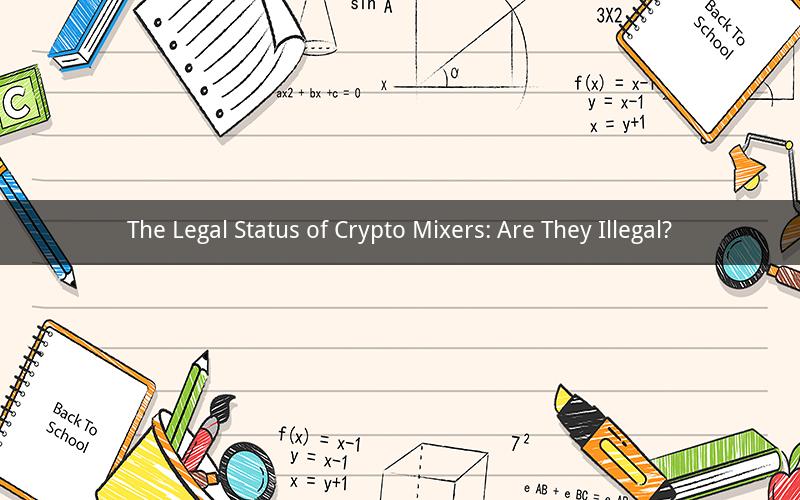
Introduction
In the ever-evolving world of cryptocurrencies, privacy has become a crucial aspect for many users. Crypto mixers, also known as tumblers, are tools designed to enhance privacy by mixing cryptocurrencies, making it difficult to trace the origin of funds. However, this has raised questions about their legality. In this article, we will explore the legal status of crypto mixers and whether they are considered illegal.
The Purpose of Crypto Mixers
Crypto mixers are used to mix different cryptocurrencies, thereby obfuscating the transaction trail. This process makes it challenging for authorities to track the origin of funds, which can be beneficial for individuals seeking privacy. However, it also raises concerns regarding the potential use of crypto mixers for illegal activities, such as money laundering.
Legal Status of Crypto Mixers
The legality of crypto mixers varies from country to country. In some jurisdictions, they are legal and regulated, while in others, they are prohibited or illegal. Here is an overview of the legal status of crypto mixers in different regions:
1. United States
In the United States, crypto mixers are not explicitly illegal. However, they fall under the purview of the Bank Secrecy Act (BSA) and the Financial Action Task Force (FATF) recommendations. According to these regulations, crypto mixers must comply with anti-money laundering (AML) and know-your-customer (KYC) requirements. Failure to comply with these regulations can result in legal consequences.
2. Europe
In Europe, the legal status of crypto mixers is somewhat ambiguous. The European Union (EU) has implemented AML and KYC requirements for crypto exchanges and wallet providers, but there is no specific legislation regarding crypto mixers. As a result, the legality of crypto mixers in Europe depends on the national regulations of each country.
3. Asia
In Asia, the legal status of crypto mixers varies significantly. Some countries, such as China and South Korea, have banned or restricted the use of crypto mixers. In contrast, countries like Japan and Singapore have implemented regulations that require crypto mixers to comply with AML and KYC requirements.
4. Africa
In Africa, the legal status of crypto mixers is still evolving. Some countries, such as Nigeria and South Africa, have implemented AML and KYC regulations for crypto exchanges and wallet providers, but there is no specific legislation regarding crypto mixers.
5. Latin America
In Latin America, the legal status of crypto mixers is mixed. Some countries, such as Argentina and Brazil, have implemented AML and KYC regulations for crypto exchanges and wallet providers, while others have yet to establish clear regulations.
Potential Legal Issues
Despite the varying legal status of crypto mixers, there are several potential legal issues associated with their use:
1. Money Laundering
One of the primary concerns regarding crypto mixers is their potential use for money laundering. By mixing cryptocurrencies, individuals can obscure the origin of funds, making it difficult for authorities to trace the money trail. This has led to calls for stricter regulations and oversight of crypto mixers.
2. Financing of Illegal Activities
Another concern is that crypto mixers can be used to finance illegal activities, such as drug trafficking, terrorism, and human trafficking. This has prompted authorities to scrutinize the use of crypto mixers and impose stricter regulations.
3. Privacy vs. Transparency
The use of crypto mixers raises a debate between privacy and transparency. Proponents argue that individuals have the right to privacy and that crypto mixers are essential for protecting their financial information. Critics, on the other hand, argue that the use of crypto mixers enables illegal activities and undermines the fight against financial crimes.
5 Questions and Answers
1. Question: Can crypto mixers be used legally?
Answer: Yes, crypto mixers can be used legally, but they must comply with AML and KYC regulations in the respective jurisdictions.
2. Question: Are crypto mixers illegal in the United States?
Answer: No, crypto mixers are not illegal in the United States, but they must comply with BSA and FATF recommendations.
3. Question: Can crypto mixers be used to hide illegal activities?
Answer: Yes, crypto mixers can be used to hide illegal activities, which is why authorities are concerned about their use and have implemented regulations to combat money laundering and financing of illegal activities.
4. Question: Do crypto mixers pose a threat to financial security?
Answer: Yes, crypto mixers can pose a threat to financial security by facilitating money laundering and financing of illegal activities.
5. Question: How can governments regulate the use of crypto mixers?
Answer: Governments can regulate the use of crypto mixers by implementing AML and KYC requirements, conducting regular audits, and imposing penalties for non-compliance.
Conclusion
The legal status of crypto mixers is a complex issue, with varying regulations across different regions. While they can be used legally, their potential for misuse and the challenges they pose to financial security make them a subject of ongoing debate. As cryptocurrencies continue to evolve, it is crucial for governments and regulators to strike a balance between privacy and transparency to ensure the integrity of the financial system.